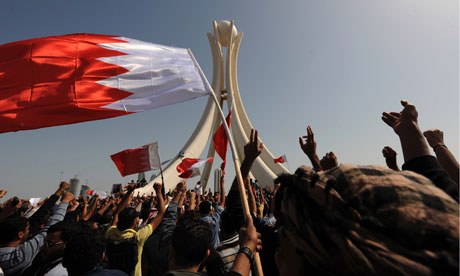In 2011, nearly half of Bahrain’s citizen population took to the streets to protest peacefully against government repression. In response, security forces employed excessive force — including tear gas and shotgun fire — to disperse the demonstrators.
Five years later, the country’s human rights situation has seen little improvement. The Bahraini government continues to suppress protests and target political activists for prosecution. On 14 March, authorities detained Zainab al-Khawaja after she was sentenced for tearing up a picture of King Hamad bin Isa Al Khalifa. Three months later, in May 2016, the government released al-Khawaja and her son from prison after her arrest drew condemnation from the international community, but, on 11 June 2016, she was forced to leave Bahrain after the authorities threatened to re-arrest her. Al-Khawaja’s father, Abdulhadi, is serving a life sentence for his participation in the 2011 protests, and her sister, Maryam, is also living in exile as a result of government persecution.
On 13 June 2016, Bahraini authorities rearrested Nabeel Rajab, President of the Bahrain Center for Human Rights (BCHR), Founding Director of the Gulf Centre for Human Rights (GCHR), and Deputy Secretary General of International Federation for Human Rights (FIDH). The government has arrested Rajab on multiple occasions since 2012. He served two years in prison between 2012 and 2014 on charges related to exercising his right to free expression. Rajab was again detained by police from April 2015 to June 2015 for his social media comments about allegations of severe and systematic mistreatment and torture of detainees in Jau Prison in March 2015.
On 14, June 2016, Bahrain’s government closed the Al-Wefaq National Islamic Society, the largest political society in the country. The United States State Department said it was “deeply troubled” by the decision but has not officially condemned the closure. A week later, the government revoked the citizenship of Ayatollah Sheikh Isa Qassim, a prominent spiritual leader of Bahrain’s Shia community and Al-Wefaq.
Though the United States stopped selling arms to Bahrain for its response to the 2011 protests, it lifted that ban on 29 June 2015. In a press statement announcing the decision, the State Department indicated that it did “not think that the human rights situation in Bahrain is adequate” but it nevertheless perceived “meaningful progress on human rights reform and reconciliation.” Recent events such as Zainab al-Khawaja’s forced exile, Nabeel Rajab’s detention, the suspension of the Al-Wefaq society, and the denaturalization of Sheikh Isa Qassim demonstrate the opposite trend, that the Bahraini human rights situation has experienced marked deterioration.
On 15, June 2016, the State Department affirmed that Bahraini government’s actions against Al-Wefaq are “not consistent with the commitment to sustaining that progress or to pursuing unfulfilled reforms.” The State Department’s spokesperson went on to emphasize that “peaceful criticism of the government plays a vital role in inclusive, pluralistic societies.” But the government of Bahrain has not demonstrated any commitment to inclusion or pluralism; on the contrary, it has repeatedly worked to exclude its critics and constrain the free development of civil society. The United States government must call on Bahraini authorities to reverse this trend, and consider re-instating the arms ban until they do.
Jaskirat Singh is an Advocacy Intern at ADHRB.





